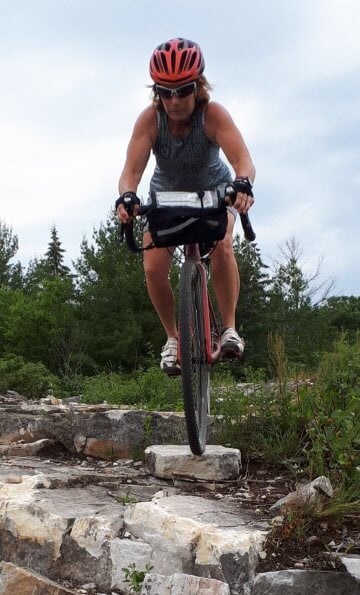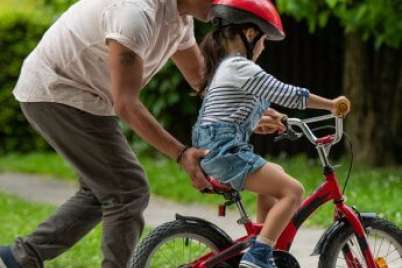
How a passionate cycling advocate is helping youth get active and engaged
Cat Weaver is doing something special for her community. She’s teaching at-risk teens how to live healthy, purposeful lives—one pedal-stroke at a time. Here’s how she founded Trips for Kids Ottawa, and also a few tips for you in case you’re inspired to set up something similar in your neighbourhood.

How it started
Weaver grew up riding a bicycle. Living in a rural community, and with no public transit available, her bike was the only way to get to town. When she moved to Ottawa as a student, she brought her bicycle with her, and she’s been riding for fun and fitness ever since.
About 15 years ago, when her now-grown kids were still in school, Weaver found herself a parent volunteer for a high school mountain bike competition. She told her daughter and son they should find some interested schoolmates and form a team.
Twenty-two students came forward, but only seven were actively riding or had their own bikes. Seeing an obvious need, Weaver asked her cycling community to lend her some equipment, and they happily complied. A lot of the kids were fairly recent arrivals to Canada, and money wasn’t always available for sports.
Weaver trained them for four weeks on the borrowed bikes. They knew how to ride, but many had to be taught how to use gears and brakes. She enlisted more volunteers, rented a bus, and took them to the competition, where they did “extremely well.”
“We came back from the competition and the kids were asking if they could continue riding—they wanted a club,” she says.
This new school club had 22 keen riders but, without all of those borrowed bikes, only five teens could ride at a time.
So Weaver started researching how to acquire more bikes. And that’s when she found Trips for Kids.
“My daughter thought that I had created the site, because its mission statement was identical to what I was trying to do,” she says. “I decided right then and there that was what I would aim for.”
Weaver’s struggling teen cycling venture and Trips for Kids were a perfect match, but turning an unfunded school club into a local chapter of Trips for Kids was beyond Weaver’s expertise. After her first application was turned down, she went looking for help.
Helen Couture, a parent of one of the participants, took on the task of getting a business number for a non-profit, writing bylaws, and volunteering as first president of the board.
Another key player in helping Weaver with her ambitious plan was current board president Mike Nash, also an original board member. “I was the face of the program and working with the kids,” Weaver offers modestly, “but there were some really smart people behind me.”
One of these smart people was a competitive master rider named Marcie Girouard, who got involved after retiring from her job as a federal government executive. According to Weaver, Girouard was a crucial addition to the team. “Her leadership was really above and beyond. I’m a better leader now because of her mentoring me.”
Once Weaver’s organization was accepted as an official chapter of Trips for Kids (one of only three in Canada), she received five more bikes from the parent organization. Others were donated or bought used.
With Nash’s help, Trips for Kids Ottawa received a grant from the Ontario Trillium Foundation. The grant paid for three shipping containers to store equipment and act as home base for rides, and it bought 70 new bikes.
The bikes are just the beginning: What the kids get can’t be bought
According to Weaver, the biggest benefit to those who take part in Trips for Kids is the feeling that they matter.
“Coming from a nursing background, I know the hierarchy of needs, and love and belonging is one of them,” she says. “Some live in neighbourhoods with gang activity. Some are on the autism spectrum. Some just don’t fit into team sports. But Trips for Kids gives teens of all abilities the chance to be a part of something.”
Food is also important. Many participants come from food-insecure homes, so Trips for Kids provides healthy homemade food.
“I half-jokingly say lots come for the food and stay for the ride. The kids feel nurtured.”
Perhaps most important of all, though, are long-term changes in the kids who take part.
Weaver tells the story of a young man with Asperger syndrome. His mom contacted Weaver, but warned her that he had tried numerous sports and given up.
“He came for five years and never missed a ride,” Weaver says. “He translated for French students whose English was poor. He felt proud to do it.”
This wasn’t the only success story. Many participants come back in the summer during university and want to volunteer. “They turn into helpful kids—I have seen young riders rise up to share leadership within their group because over time they gained the confidence to do it.”
When the COVID-19 pandemic hit, Weaver had to shift gears and trade bikes for boots on the ground. Unable to safely share bikes and equipment, she began organizing group hikes, which enabled the kids to bond and enjoy the outdoors more safely.
This summer she’s hoping to resume the rides, but in smaller groups. Naturally, though, public health guidance will dictate what Trips for Kids Ottawa can and cannot do.
Your turn: Weaver’s advice for starting your own group
Are you inspired yet? If so, Weaver says you need three elements to start your own group: A few adults who are passionate about getting kids on bikes, the bikes and helmets, and, finally, food.
“We have had tremendous support from local grocery stores and generous individuals. Bikes or helmets can be borrowed, or you can just put an ask out for used bikes. Don’t be afraid to ask your local bike shop for water bottles or parts, and ask the cycling community to donate bikes or anything else.”
Weaver believes people generally want to help, especially when kids are involved. But, she goes on, “What made it happen for me were the people who had the skills I didn’t, who came with me on this journey and became a team.”
A key member of the team is volunteer accountant David Mirsky, of whom Weaver says: “Nothing would be possible without his services.” Mirsky has provided specialized support to Trips for Kids Ottawa as a volunteer since 2013.
“When I started, I was on my own and needed help. Now I have 70 volunteers. When people know it’s a good thing we’re doing, they want to be involved. But once again, don’t be afraid to ask.”
Asked if she ever feels overwhelmed, Weaver replies, “Always … and then I go for a bike ride.”
Ready to get biking? Here’s how to find a chapter in your region. Even better, here’s how to start up your own!
With COVID restrictions in place, Trips for Kids Ottawa, along with many of its sponsors, is struggling. If you want to make a donation to help Trips for Kids Ottawa continue its important work, you can do so here.
Photos courtesy of Trips for Kids Ottawa.
Further reading:
For new cyclists, developing confidence is key





